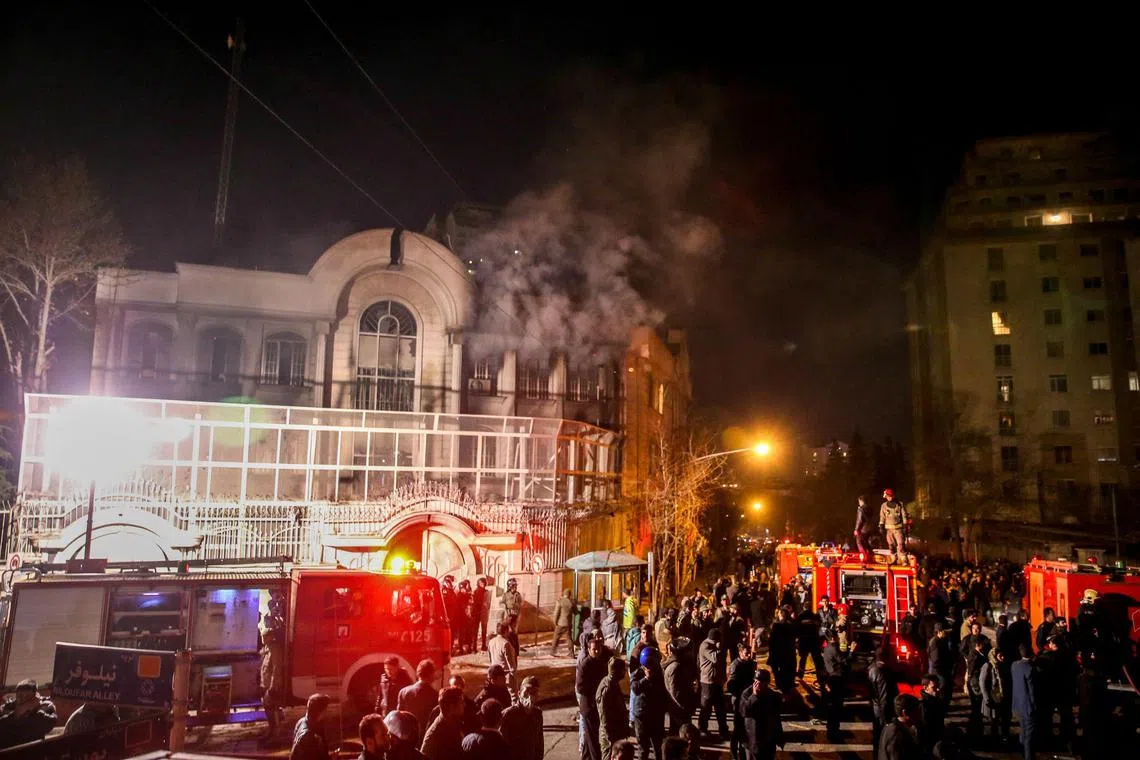Iran and Saudi Arabia agree to resume ties in deal brokered with China’s help
Sign up now: Get ST's newsletters delivered to your inbox

Saudi Arabia cut ties with Iran completely in 2016, when protesters stormed the Saudi embassy in Teheran following the execution of a prominent Saudi Shi'ite cleric.
PHOTO: AFP
Follow topic:
RIYADH - Iran and Saudi Arabia agreed on Friday to re-establish relations after seven years of hostility that have threatened stability and security in the Gulf and helped fuel conflicts in the Middle East from Yemen to Syria.
The deal was announced after four days of previously undisclosed talks in Beijing between top security officials from the two rival Middle East powers.
Iran and Saudi Arabia agreed to reactivate a lapsed security cooperation agreement – a shift that comes after years of Iranian proxies targeting Saudi Arabia with missile and drone attacks – as well as older trade, investment and cultural pacts.
Saudi Arabia and Iran will reopen their respective embassies within two months, and both states confirmed “their respect for the sovereignty of nations and non-interference in their internal affairs”, the statement said.
Both countries thanked China, as well as Iraq and Oman for hosting earlier talks in 2021 and 2022.
The agreement was signed by Iran’s top security official, Mr Ali Shamkhani, and Saudi Arabia’s national security adviser Musaed bin Mohammed Al-Aiban. A third signatory was China’s top diplomat Wang Yi.
“Talks were advanced on the basis of the consensus of the leaders of China, Saudi Arabia and Iran... China will continue to play a constructive role in handling hot-spot issues, (and) demonstrate our responsibility as a major nation,” said Mr Wang.
A White House national security spokesman said the United States was aware of reports of the agreement and welcomed any efforts to help end the war in Yemen and de-escalate tensions in the Middle East.
“Generally speaking, we welcome any efforts to help end the war in Yemen and de-escalate tensions in the Middle East region. De-escalation and diplomacy, together with deterrence, are key pillars of the policy President (Joe) Biden outlined during his visit to the region last year,” the spokesman told Reuters.
Iraq also welcomed the agreement, saying the move would lead to a new phase in relations between its two neighbours.
“A new page has been opened in diplomatic relations between the two countries,” said a statement from the Foreign Ministry of Iraq, which has hosted several rounds of reconciliation talks between the rivals since 2021.
After years of regional rivalry, Saudi Arabia cut its ties with Iran completely in 2016, when protesters stormed the kingdom’s embassy in Teheran following Riyadh’s execution of a prominent Saudi Shi’ite cleric.
The conflict between the two Islamic nations, located less than 240km away from each other across the Persian Gulf, has long shaped politics and trade in the Middle East.
Tensions hit a peak in 2019, when a missile and drone assault on a key Saudi oil installation briefly disrupted half of the kingdom’s crude production. US officials said the attack was overseen directly by Iran.
The two countries have also faced off in Yemen, where a Saudi-led coalition is fighting Houthi rebels that Iran has supported.
Saudi officials have also repeatedly expressed fear over Iran’s nuclear programme, saying that they would be the foremost target for the Islamic Republic.
However, over the past few years, they have engaged in a series of talks with Iranian delegations, with both sides hoping to ease tensions.
A senior Iranian security official said Friday’s agreement was endorsed by Supreme Leader Ayatollah Ali Khamenei.
“That is why Shamkhani travelled to China as the supreme leader’s representative,” the official told Reuters. “The establishment wanted to show that the top authority in Iran backed this decision.” REUTERS, NYTIMES

